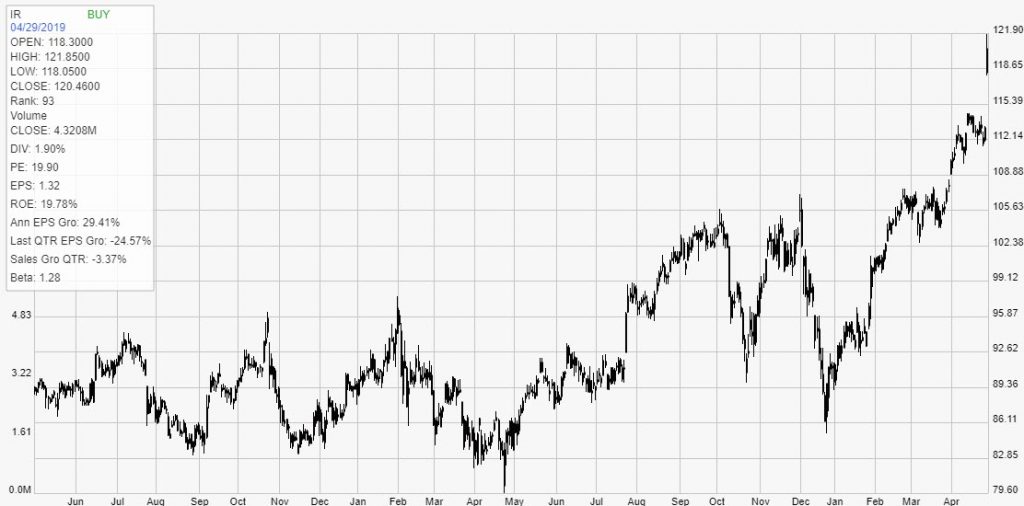Shares of industrial manufacturing firm Ingersoll-Rand Plc. (IR) soared to an all-time high during Monday’s session on news that another industrial product company is likely to announce a buyout bid for one of Ingersoll’s largest business units as soon as this week. Although Monday was filled with merger news across the industrials sector – including Parker-Hannifin Corp. (PH) announcing a $3.7 billion acquisition of adhesives producer Lord Corp. – rumors of the Ingersoll purchase made it the biggest gainer on the S&P 500 for the day.
Despite not being much of a household name, Ingersoll wields more influence on the industrials sector than most investors may understand. Its diverse business – which produces everything from HVAC equipment to golf carts – has been its biggest strength for most of its 148-year history. That history – combined with the unique nature of Monday’s deal – has investors curious as to whether or not one of Ingersoll’s most prosperous divisions will be in good hands under new ownership.
Here are the confirmed details of Ingersoll’s transaction – and what investors can expect moving forward…
The News
Insiders familiar with the deal announced that Gardner Denver Holdings Inc. (GDI), the Milwaukee-based industrial products giant that also sells energy and medical products, is close to formally announcing a bid to buy Ingersoll’s primary industrial tools unit. While the deal size has yet to be determined, it would apparently give Gardner Denver a new enterprise value (EV) of $15 billion, up from the firm’s current market value near $5.8 billion.
Adding Ingersoll’s industrials segment would provide a massive boost to Gardner’s overall revenue stream, which clocked in at $2.69 billion last year. For comparison, Ingersoll’s industrials segment alone raked in $3.32 billion over the same period. If sales maintained that same pace, Gardner’s revenue could more than double in the 12-month period following the transaction’s close.
How Investors Reacted
The news made IR stock the S&P 500’s best performer on Monday, as shares rallied 6.5% from $113.11 last Friday to $120.46. That performance beat the index’s second and third best-performing companies Archer Daniels Midland Co. (ADM) and Mattel Inc. (MAT), which respectively climbed 5.8% and 3.1% during the session. It was also Ingersoll’s best close ever and gave shares a total 32% gain in 2019 so far. And if Ingersoll surpasses earnings expectations once it releases Q1 financials on Tuesday, the company could very well experience one of its best weekly performances ever on the stock market.
Even better was Gardner Denver, whose shares exploded 16% on the day to a more than 10-month high of $32.55. At that close, GDI stock is now up a massive 59.2% from its Dec. 31 close of $20.45.
The Bigger Picture
Merger rumors typically lead to short-term rallies that come back down to Earth if the investing public gets wind of how ridiculous they are. The most notable example of “buy the rumor, sell the news” occurred last month when shares of Take-Two Interactive Software Inc. (TTWO) roared 6.9% on groundless claims that Sony Corp. (SNE) was looking to purchase the game developer. But despite the acquisition of Ingersoll’s industrials business seeming highly logical, it boasts one interesting angle that, while still technically rumored, makes the deal one of the more interesting ones to pop up in the news this year.
It concerns the fact that the merger would be structured as a Reverse Morris Trust (RMT), a type of deal that offers certain tax benefits for the purchasing company. Specifically, a RMT allows a company to sell a sector of its business without paying taxes on the deal, as long as terms – such as how the company needs to first spin off the sector as its own company before selling it – are met and approved.
But the biggest component of a RMT is that, under the terms of the deal, shareholders of the company selling one of its businesses have to become the majority owners of the purchasing company. That means, in the case of Ingersoll and Gardner, Ingersoll shareholders immediately own more than half of the newly formed Gardner once the merger closes.
This is the heavy cost of paying no taxes, and it indicates that Gardner must really need Ingersoll’s industrials business if it’s willing to go through with such a uniquely structured deal. However, sector-dominant companies can typically afford such deals, as investors saw in 2007 when Verizon Communications Inc. (VZ) sold Northeastern landline operations to FairPoint Communications.
Looking Ahead
The unique structure of the RMT notwithstanding, both Ingersoll and Gardner stand to benefit handsomely from the deal moving forward. However, Gardner will likely benefit more given how Ingersoll’s industrials business will more than double Gardner’s company-wide revenue in the next 12 months or more. Investors primarily focused on balance sheets and bottom-line fundamentals should consider GDI stock as a long-term portfolio hold, especially given the industrials sector’s immense strength so far this year.
